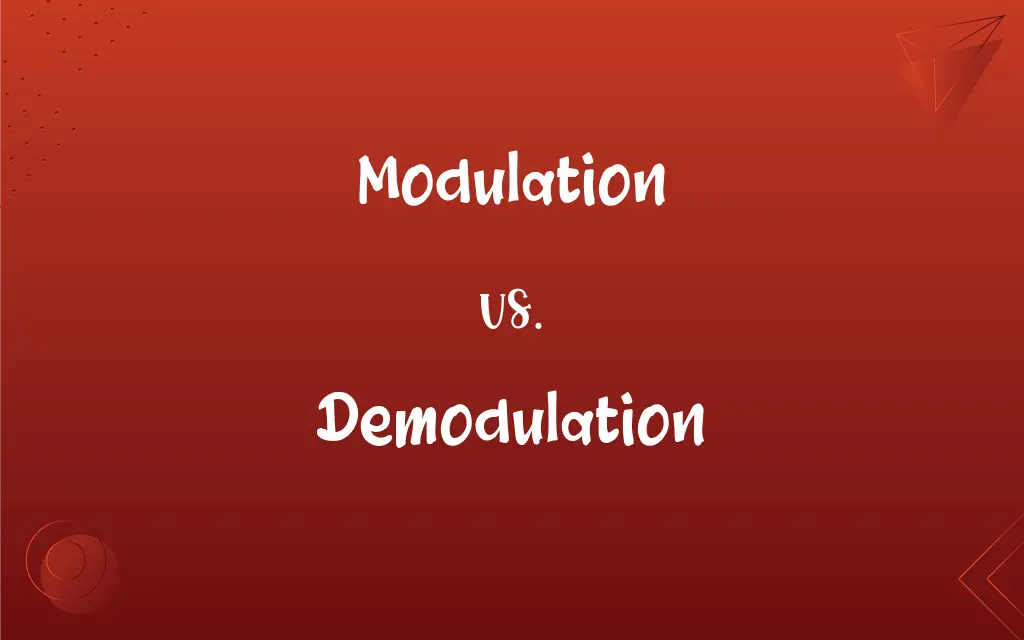Modulation vs. Demodulation: What's the Difference?
Edited by Aimie Carlson || By Janet White || Published on February 23, 2024
Modulation is the process of encoding information onto a carrier wave, while demodulation is the process of extracting this information from the wave.

Key Differences
Modulation is a technique used in communication systems to transfer information by altering certain properties of a carrier wave, such as amplitude, frequency, or phase. Demodulation, on the other hand, is the reverse process where the original information is retrieved from the modulated carrier wave. Both processes are essential for effective communication in various mediums.
There are various types of modulation, like Amplitude Modulation (AM) and Frequency Modulation (FM), each with specific uses and advantages. Demodulation techniques correspond to these types and are designed to accurately recover the original signal from the modulated carrier. The choice of modulation and demodulation technique depends on factors like the communication channel, the type of data, and transmission distance.
Modulation allows the efficient transmission of signals over long distances by adapting them to the communication medium, such as radio waves for broadcasting. Demodulation is equally important as it enables the receiver to convert these signals back into a usable form. Without these processes, modern wireless communication would not be possible.
In modulation, challenges include maintaining signal integrity and minimizing interference. In demodulation, accurately extracting the original signal from a potentially degraded carrier wave is crucial. Advanced techniques like digital modulation and demodulation have been developed to address these challenges, improving reliability and quality of communication.
Modulation is used in various applications like radio broadcasting, TV transmission, and cellular communication. Demodulation is key in receivers like radios, televisions, and smartphones, enabling these devices to interpret the transmitted signals. The interplay of modulation and demodulation is fundamental to the functionality of these devices.
ADVERTISEMENT
Comparison Chart
Definition
Process of encoding information onto a carrier wave.
Process of extracting information from a modulated carrier wave.
Purpose
To adapt a signal for transmission over a communication medium.
To retrieve the original signal from a modulated wave.
Techniques
Amplitude, Frequency, Phase Modulation, etc.
Corresponding techniques to the type of modulation used.
Key Challenges
Maintaining signal integrity, minimizing interference.
Accurate extraction of the signal, handling degraded carrier waves.
Applications
Used in transmitting signals in radio, TV, and cellular communication.
Used in receiving signals in radios, TVs, smartphones, etc.
ADVERTISEMENT
Modulation and Demodulation Definitions
Modulation
Modulation involves altering a carrier wave to transmit information.
Radio stations use modulation to encode audio signals for transmission.
Demodulation
Demodulation is the process of decoding information from a carrier wave.
Your FM radio demodulates signals to produce audio.
Modulation
Modulation can change amplitude, frequency, or phase of the carrier wave.
FM radio uses frequency modulation for a clearer sound than AM.
Demodulation
Demodulation restores a signal to its original form after transmission.
Satellite dishes demodulate signals to display TV channels.
Modulation
Modulation is essential for transmitting signals over various distances.
Satellite communication relies on modulation to send signals to Earth.
Demodulation
Demodulation is crucial in wireless communication systems.
Smartphones demodulate signals for voice and data communication.
Modulation
Modulation makes efficient use of the frequency spectrum.
Cellular networks modulate signals to accommodate multiple users.
Demodulation
Demodulation techniques vary depending on the type of modulation used.
Digital receivers use complex algorithms for demodulation of digital signals.
Modulation
Digital modulation includes methods like QAM and PSK.
Digital TV uses QAM modulation for efficient data transmission.
Demodulation
Effective demodulation ensures high-quality signal reception.
In WiFi networks, demodulation contributes to the speed and reliability of connections.
Modulation
The act or process of modulating.
Demodulation
The conversion of a modulated carrier wave into a current equivalent to the original signal. Also called detection.
Demodulation
The inverse of the effect of modulation, or applying a signal to a carrier.
A radio transmitter applies modulation to a carrier wave and the receiver applies demodulation to it to recover the message.
Demodulation
(electronics) the reception of a signal by extracting it from the carrier wave
FAQs
Why is modulation important?
It allows efficient and effective transmission of signals over distances.
How does demodulation contribute to communication?
It ensures the accurate retrieval of original signals for effective communication.
Can modulation techniques vary with applications?
Yes, different applications use different modulation techniques based on requirements.
What challenges are associated with demodulation?
Challenges include accurately extracting signals from degraded carrier waves.
How does digital modulation differ from analog?
Digital modulation involves discrete signal levels, offering improved efficiency and quality.
Do modulation and demodulation affect data transmission speed?
Yes, efficient modulation and demodulation can impact the speed and quality of data transmission.
What is modulation?
Modulation is encoding information onto a carrier wave for transmission.
Why is demodulation necessary?
It's essential to convert transmitted signals back into a usable form.
What are common types of modulation?
Common types include AM, FM, and digital modulation techniques.
How does modulation affect signal quality?
Proper modulation ensures signal integrity and minimizes interference.
What is demodulation?
Demodulation is the process of decoding information from a modulated carrier wave.
Are demodulation techniques universal?
Demodulation techniques are specific to the type of modulation used.
Is demodulation complex in digital communication?
Yes, digital demodulation can be complex, requiring advanced algorithms.
Are there new trends in modulation techniques?
New trends include advanced digital modulation methods for better performance.
How does environment affect demodulation?
Environmental factors like noise can affect the quality of demodulation.
Can modulation be used in wired communication?
Yes, modulation is also used in wired communication like DSL.
How do modulation and demodulation impact mobile communication?
They are fundamental to transmitting and receiving data in mobile networks.
What role does demodulation play in Internet connectivity?
In Internet connectivity, demodulation enables the reception of data signals.
Can the same device perform both modulation and demodulation?
Yes, devices like modems perform both modulation and demodulation.
What advancements are being made in demodulation technology?
Advancements include more efficient algorithms for handling complex signal environments.
About Author
Written by
Janet WhiteJanet White has been an esteemed writer and blogger for Difference Wiki. Holding a Master's degree in Science and Medical Journalism from the prestigious Boston University, she has consistently demonstrated her expertise and passion for her field. When she's not immersed in her work, Janet relishes her time exercising, delving into a good book, and cherishing moments with friends and family.
Edited by
Aimie CarlsonAimie Carlson, holding a master's degree in English literature, is a fervent English language enthusiast. She lends her writing talents to Difference Wiki, a prominent website that specializes in comparisons, offering readers insightful analyses that both captivate and inform.































































